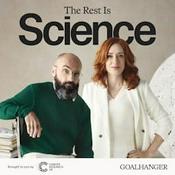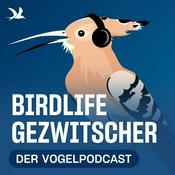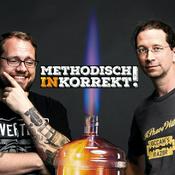Verfügbare Folgen
5 von 168
- Tortoise TomfooleryTortoises have traditionally been the poster child for slowness. These ancient, armoured reptiles are solitary, territorial and all-too-often dismissed as dull.In fact, tortoises have distinct personalities. They have changeable moods, can learn simple tasks, remember certain useful information for years and even recognise familiar people. But can they play?Hot on the trail of tortoise tomfoolery, Hannah and Dara explore the stereotype-smashing studies that show there's far more to these creatures than previously thought; and find out that these complex behaviours might apply not only to the turtle clan, but potentially other reptiles as well...To submit your question to the Curious Cases team, please email: [email protected]: - Anna Wilkinson, Professor of Animal Cognition at the University of Lincoln - Unnar Karl Aevarsson, Herpetologist at ZSL London Zoo - Gordon Burghardt, Distinguished Service Professor in the Departments of Psychology, Ecology and Evolutionary Biology at the University of Tennessee Producer: Lucy Taylor Executive Producer: Alexandra Feachem A BBC Studios Production--------28:44
- Planetary WobbleCould you survive an eternal winter? Or is endless summer sun a more appealing prospect? Lots of us are grateful for the seasonal changes that shape the world around us, but this week Hannah and Dara are asking what life would look like without the axial tilt that brings each hemisphere closer and further away from the sun as the seasons change each year. Listener Andrew from Melbourne wants to know what would happen if the planet stood perfectly upright, no lean, no tilt, no seasons. But what else could happen? Is Earth’s 23-degree slant the cosmic fluke that made life possible? To find out, Hannah and explore how losing the tilt reshapes climate, ecosystems, evolution and maybe even the fate of the dinosaurs.You can send your everyday mysteries for the team to investigate to: [email protected] Contributors Dr Robin Smith - Climate modelling researcher at the University of Reading Professor Rebecca Kilner - Evolutionary Biologist and Head of the Department of Zoology at Cambridge Professor Amaury Triaud - Professor of Exoplanetology at the University of Birmingham Aidan McGivern - Meteorologist and Senior weather presenter at the MET OfficeProducer: Emily Bird Executive Producer: Sasha Feachem A BBC Studios Production--------28:28
- Immortal JelliesCould immortality ever be possible for humans? It sounds like something from a sci-fi movie, but floating in oceans around the world is a tiny, transparent jellyfish that could hold the answer...Turritopsis dohrnii, known as 'the immortal jellyfish', isn’t immortal in the true sense of word - it can die - but it has a nifty way of avoiding that fate. In times of stress, this miniscule jelly can biologically reverse its aging process, reverting from 'medusa' (adult jellyfish) to a juvenile form and starting its life-cycle again; potentially ad infinitum.Abilities like these could hold the key to - if not exactly 'immortality', then at least regenerative or long-life treatments for humans in future. But of course there's a catch: these extremely delicate jellyfish can still easily die from predation, disease, or environmental threats and are extremely difficult to keep healthy in a lab environment. Hannah and Dara hear about new technology that could change the way we study immortal jellyfish, and discover various other super-abilities in the animal kingdom that could help in our quest for healthier, longer lives.Contributors: - Miranda Lowe, Principal Curator of Crustacea and Cnidaria at London’s Natural History Museum - Alex Cagan, Assistant Professor in the Department of Genetics, Department of Pathology and Department of Vet Medicine at the University of Cambridge - Maria Pia Miglietta, Associate Professor of Marine Biology at Texas A&M University in Galveston - Nicole Xu, Assistant Professor of Mechanical Engineering, Robotics and Biomedical Engineering at the University of Colorado, BoulderProducer: Lucy Taylor Executive Producer: Sasha Feachem A BBC Studios Production--------28:52
- Mysteries from the Final FrontierSpace: the final frontier, a deep dark realm full of questions and mysteries - many of which science can't yet satisfactorily answer. But that won't stop the Curious Cases team!In a special edition recorded in front of an audience at the BBC Radio Theatre in London, Hannah Fry and Dara Ó Briain team up with a panel of guests who know their way around the universe: presenters from the world's longest running science TV show, The Sky At Night.With the intergalactic expertise of George Dransfield, Chris Lintott and Maggie Aderin-Pocock, Hannah and Dara tackle a slew of space-related questions put forward by the listeners - exploring topics ranging from the sound of stars and the shape of the universe, to the search for alien life. To submit your question to the Curious Cases team, please email: [email protected] AUDIO CLIPS:- Maggie's Choice: In 2005, the European Space Agency's Huygens probe descended to the surface of Saturn's moon Titan. Microphones aboard Huygens recorded the sounds of descent and landing, then The Planetary Society and scientists at the University of California helped ESA process the audio. CREDIT: European Space Agency (Huygens probe) / HASI-PWA Team (instrument and data) / The Planetary Society (processing)- George's Choice: The black hole at the centre of the Perseus galaxy cluster has been associated with sound for years, since astronomers discovered that pressure waves sent out by the black hole caused ripples in the cluster's hot gas that could be translated into a note. This new sonification was released for NASA's Black Hole Week in 2022. CREDIT: NASA- Chris's Choice: In 2023, the Planck space telescope picked up echoes left by soundwaves that travelled through the early Universe. This primordial hum was then translated into frequencies we can hear. CREDIT: NASAProducer: Lucy Taylor Executive Producer: Alexandra Feachem A BBC Studios Production--------28:39
- Beam Me Up, Scotty!Whether you’re stuck in traffic, waiting at the airport whilst delay after delay is announced or just really missing someone far away, a lot of us have probably wished we could teleport. But is this superpower the stuff of science fiction? Or could it, one day, become a reality?Listener Faith wants to know whether Star Trek’s Transporter could ever deconstruct and reconstruct humans in the real world, and it turns out quantum physics holds some tantalising potential for this seemingly impossible task. To search for answers Hannah and Dara dive down the quantum rabbit hole, exploring entanglement, superposition, and trying on some very special socks. Contributors Ivette Fuentes - Professor of Quantum Physics at University of Southampton Winfried Hensinger - Professor of Quantum Technologies at the University of Sussex Helen Beebee - Professor of the Philosophy of Science at the University of Leeds Producer: Emily Bird Executive Producer: Sasha Feachem A BBC Studios Production--------28:50
Weitere Wissenschaft Podcasts
Trending Wissenschaft Podcasts
Über Curious Cases
Hannah Fry and Dara Ó Briain tackle listeners' conundrums with the power of science!
Podcast-WebsiteHöre Curious Cases, Radiowissen und viele andere Podcasts aus aller Welt mit der radio.at-App

Hol dir die kostenlose radio.at App
- Sender und Podcasts favorisieren
- Streamen via Wifi oder Bluetooth
- Unterstützt Carplay & Android Auto
- viele weitere App Funktionen
Hol dir die kostenlose radio.at App
- Sender und Podcasts favorisieren
- Streamen via Wifi oder Bluetooth
- Unterstützt Carplay & Android Auto
- viele weitere App Funktionen


Curious Cases
Code scannen,
App laden,
loshören.
App laden,
loshören.




































